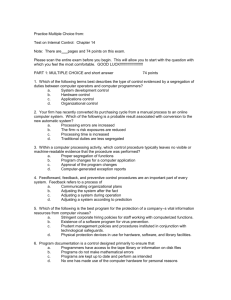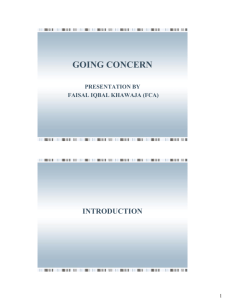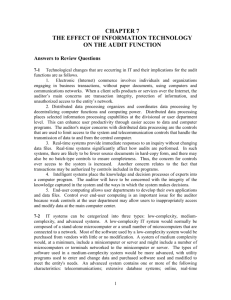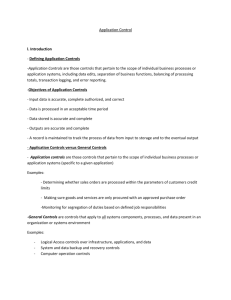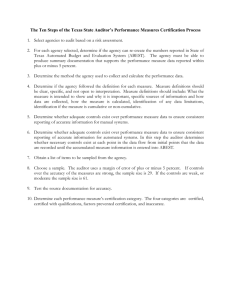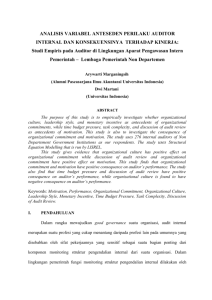Going Concern
advertisement
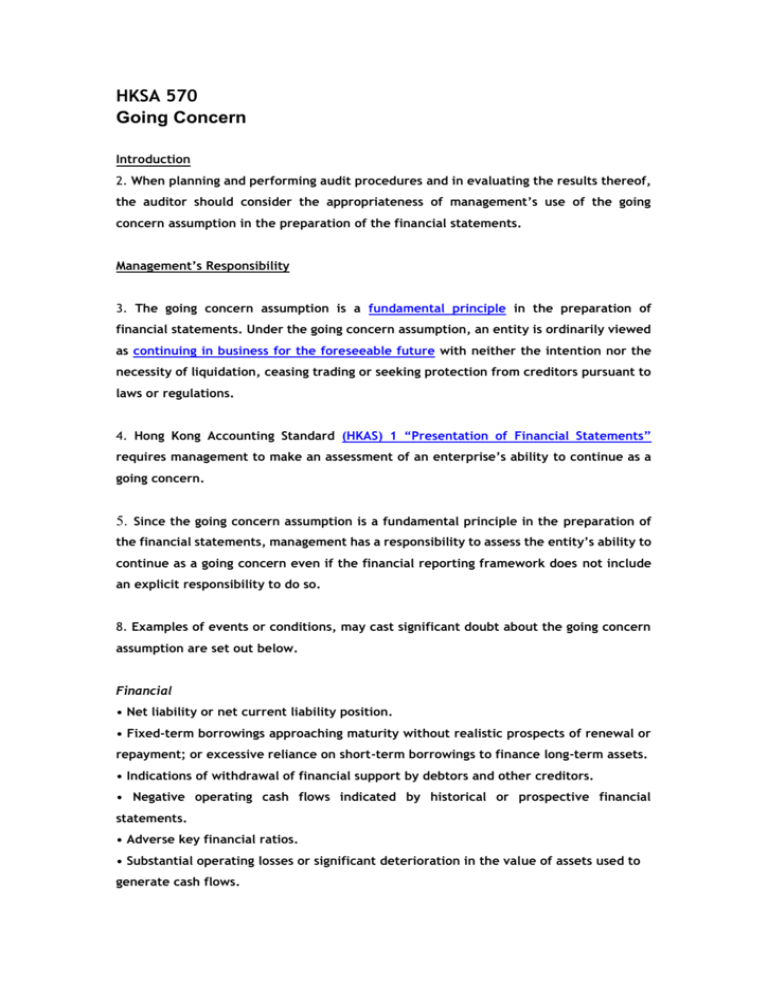
HKSA 570 Going Concern Introduction 2. When planning and performing audit procedures and in evaluating the results thereof, the auditor should consider the appropriateness of management’s use of the going concern assumption in the preparation of the financial statements. Management’s Responsibility 3. The going concern assumption is a fundamental principle in the preparation of financial statements. Under the going concern assumption, an entity is ordinarily viewed as continuing in business for the foreseeable future with neither the intention nor the necessity of liquidation, ceasing trading or seeking protection from creditors pursuant to laws or regulations. 4. Hong Kong Accounting Standard (HKAS) 1 “Presentation of Financial Statements” requires management to make an assessment of an enterprise’s ability to continue as a going concern. 5. Since the going concern assumption is a fundamental principle in the preparation of the financial statements, management has a responsibility to assess the entity’s ability to continue as a going concern even if the financial reporting framework does not include an explicit responsibility to do so. 8. Examples of events or conditions, may cast significant doubt about the going concern assumption are set out below. Financial • Net liability or net current liability position. • Fixed-term borrowings approaching maturity without realistic prospects of renewal or repayment; or excessive reliance on short-term borrowings to finance long-term assets. • Indications of withdrawal of financial support by debtors and other creditors. • Negative operating cash flows indicated by historical or prospective financial statements. • Adverse key financial ratios. • Substantial operating losses or significant deterioration in the value of assets used to generate cash flows. HKSA 570 Going Concern • Arrears or discontinuance of dividends. • Inability to pay creditors on due dates. • Inability to comply with the terms of loan agreements. • Change from credit to cash-on-delivery transactions with suppliers. • Inability to obtain financing for essential new product development or other essential investments. Operating • Loss of key management without replacement. • Loss of a major market, franchise, license, or principal supplier. • Labor difficulties or shortages of important supplies. Other • Non-compliance with capital or other statutory requirements. • Pending legal or regulatory proceedings against the entity that may, if successful, result in claims that are unlikely to be satisfied. • Changes in legislation or government policy expected to adversely affect the entity. Auditor’s Responsibility 9. The auditor’s responsibility is to consider the appropriateness of management’s use of the going concern assumption in the preparation of the financial statements, and consider whether there are material uncertainties about the entity’s ability to continue as a going concern that need to be disclosed in the financial statements. Auditor’s Approach 1. Planning and Risk Assessment 2. Evaluating Management’s Assessment 3. Period Beyond Management’s Assessment 4. Further Audit Procedures 5. Conclusions and Reporting HKSA 570 Going Concern 1) Planning the Audit and Performing Risk Assessment Procedures 11. In obtaining an understanding of the entity, the auditor should consider whether there are events or conditions and related business risks which may cast significant doubt on the entity’s ability to continue as a going concern. 12. The auditor should remain alert for audit evidence of events or conditions and related business risks which may cast significant doubt on the entity’s ability to continue as a going concern in performing audit procedures throughout the audit. If such events or conditions are identified, the auditor should, in addition to performing the procedures in paragraph 26, consider whether they affect the auditor’s assessment of the risks of material misstatement. 2) Evaluating Management’s Assessment 17. The auditor should evaluate management’s assessment of the entity’s ability to continue as a going concern. 18. The auditor should consider the same period as that used by management in making its assessment under the applicable financial reporting framework. If management’s assessment of the entity’s ability to continue as a going concern covers less than twelve months from the balance sheet date, the auditor should ask management to extend its assessment period to twelve months from the balance sheet date. 19. Management’s assessment of the entity’s ability to continue as a going concern is a key part of the auditor’s consideration of the going concern assumption. 20. In evaluating management’s assessment, the auditor considers -the process management followed to make its assessment -the assumptions on which the assessment is based -management’s plans for future action. -whether the assessment has taken into account all relevant information of which the auditor is aware as a result of the audit procedures. HKSA 570 Going Concern 3) Period Beyond Management’s Assessment 22. The auditor should inquire of management as to its knowledge of events or conditions and related business risks beyond the period of assessment used by management that may cast significant doubt on the entity’s ability to continue as a going concern. 25. The auditor does not have a responsibility to design audit procedures other than inquiry of management to test for indications of events or conditions which cast significant doubt on the entity’s ability to continue as a going concern beyond the period assessed by management which, as discussed in paragraph 18, would be at least twelve months from the balance sheet date. 4) Further Audit Procedures when Events or Conditions are Identified 26. When events or conditions have been identified which may cast significant doubt on the entity’s ability to continue as a going concern, the auditor should: (a) Review management’s plans for future actions based on its going concern assessment; (b) Gather sufficient appropriate audit evidence to confirm or dispel whether or not a material uncertainty exists through carrying out audit procedures considered necessary, including considering the effect of any plans of management and other mitigating factors; and (c) Seek written representations from management regarding its plans for future action. 27. Events or conditions which may cast significant doubt on the entity’s ability to continue as a going concern may be identified in performing risk assessment procedures or in the course of performing further audit procedures. When the auditor believes such events or conditions may cast significant doubt on the entity’s ability to continue as a going concern, certain audit procedures may take on added significance. HKSA 570 Going Concern 28. Audit procedures that are relevant in this regard may include the following: • Analyzing and discussing cash flow, profit and other relevant forecasts with management. • Analyzing and discussing the entity’s latest available interim financial statements. • Reviewing the terms of debentures and loan agreements and determining whether any have been breached. • Reading minutes of the meetings of shareholders, those charged with governance and relevant committees for reference to financing difficulties. • Inquiring of the entity’s lawyer regarding the existence of litigation and claims and the reasonableness of management’s assessments of their outcome and the estimate of their financial implications. • Confirming the existence, legality and enforceability of arrangements to provide or maintain financial support with related and third parties and assessing the financial ability of such parties to provide additional funds. • Considering the entity’s plans to deal with unfilled customer orders. • Reviewing events after period end to identify those that either mitigate or otherwise affect the entity’s ability to continue as a going concern. 5) Audit Conclusions and Reporting 30. Based on the audit evidence obtained, the auditor should determine if, in the auditor’s judgment, a material uncertainty exists related to events or conditions that alone or in aggregate, may cast significant doubt on the entity’s ability to continue as a going concern. 31. A material uncertainty exists when the magnitude of its potential impact is such that, in the auditor’s judgment, clear disclosure of the nature and implications of the uncertainty is necessary for the presentation of the financial statements not to be misleading. HKSA 570 Going Concern Going Concern Assumption Appropriate But a Material Uncertainty Exists 32. If the use of the going concern assumption is appropriate but a material uncertainty exists, the auditor considers whether the financial statements: (a) Adequately describe the principal events or conditions that give rise to the significant doubt on the entity’s ability to continue in operation and management’s plans to deal with these events or conditions; and (b) State clearly that there is a material uncertainty related to events or conditions which may cast significant doubt on the entity’s ability to continue as a going concern and, therefore, that it may be unable to realize its assets and discharge its liabilities in the normal course of business. 33. If adequate disclosure is made in the financial statements, the auditor should express an unqualified opinion but modify the auditor’s report by adding an emphasis of matter paragraph that highlights the existence of a material uncertainty relating to the event or condition that may cast significant doubt on the entity’s ability to continue as a going concern and draws attention to the note in the financial statements that discloses the matters set out in paragraph 32. In extreme cases, such as situations involving multiple material uncertainties that are significant to the financial statements, the auditor may consider it appropriate to express a disclaimer of opinion instead of adding an emphasis of matter paragraph. 34. If adequate disclosure is not made in the financial statements, the auditor should express a qualified or adverse opinion, as appropriate. The report should include specific reference to the fact that there is a material uncertainty that may cast significant doubt about the entity’s ability to continue as a going concern. HKSA 570 Going Concern Going Concern Assumption Inappropriate 35. If, in the auditor’s judgment, the entity will not be able to continue as a going concern, the auditor should express an adverse opinion if the financial statements have been prepared on a going concern basis. Management Unwilling to Make or Extend its Assessment 37. If management is unwilling to make or extend its assessment when requested to do so by the auditor, the auditor should consider the need to modify the auditor’s report as a result of the limitation on the scope of the auditor’s work.
